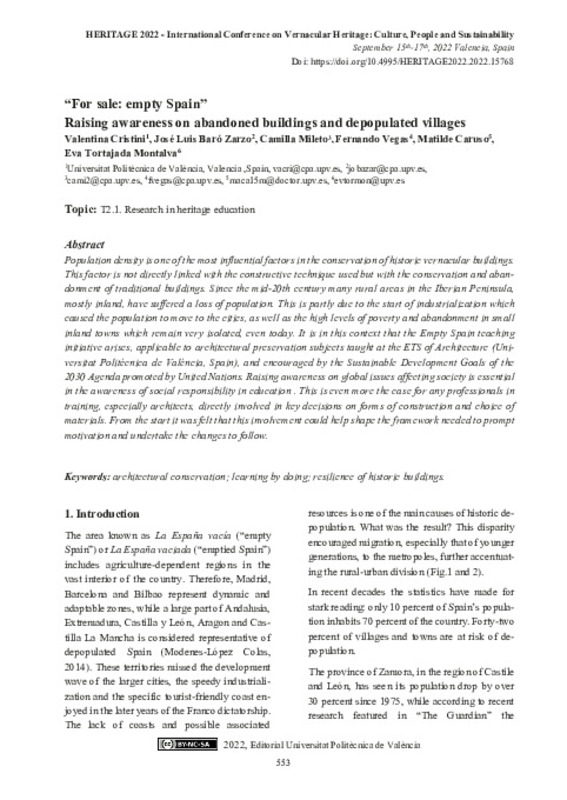Cristini, V.; Baró Zarzo, JL.; Mileto, C.; Vegas López-Manzanares, F.; Caruso, M.; Tortajada Montalva, E. (2022). “For sale: empty Spain” Raising awareness on abandoned buildings and depopulated villages. En Proceedings HERITAGE 2022 - International Conference on Vernacular Heritage: Culture, People and Sustainability. Editorial Universitat Politècnica de València. 553-558. https://doi.org/10.4995/HERITAGE2022.2022.15768
Por favor, use este identificador para citar o enlazar este ítem: http://hdl.handle.net/10251/188940
|
Título:
|
“For sale: empty Spain” Raising awareness on abandoned buildings and depopulated villages
|
|
Autor:
|

 Cristini, Valentina
Cristini, Valentina

 Baró Zarzo, José Luis
Baró Zarzo, José Luis

 Mileto, Camilla
Mileto, Camilla
 Vegas López-Manzanares, Fernando
Vegas López-Manzanares, Fernando

 Caruso, Matilde
Caruso, Matilde

 Tortajada Montalva, Eva
Tortajada Montalva, Eva
|
|
Entidad UPV:
|
Universitat Politècnica de València. Departamento de Composición Arquitectónica - Departament de Composició Arquitectònica
Universitat Politècnica de València. Centro de Investigación Arquitectura, Patrimonio y Gestión para el Desarrollo Sostenible - Centre d'Investigació Arquitectura, Patrimoni i Gestió per al Desenvolupament Sostenible
Universitat Politècnica de València. Escuela Técnica Superior de Arquitectura - Escola Tècnica Superior d'Arquitectura
|
|
Fecha difusión:
|
|
|
Resumen:
|
[EN] Population density is one of the most influential factors in the conservation of historic vernacular buildings. This factor is not directly linked with the constructive technique used but with the conservation and ...[+]
[EN] Population density is one of the most influential factors in the conservation of historic vernacular buildings. This factor is not directly linked with the constructive technique used but with the conservation and abandonment of traditional buildings. Since the mid-20th century many rural areas in the Iberian Peninsula, mostly inland, have suffered a loss of population. This is partly due to the start of industrialization which caused the population to move to the cities, as well as the high levels of poverty and abandonment in small inland towns which remain very isolated, even today. It is in this context that the Empty Spain teaching initiative arises, applicable to architectural preservation subjects taught at the ETS of Architecture (Universitat Politècnica de València, Spain), and encouraged by the Sustainable Development Goals of the 2030 Agenda promoted by United Nations. Raising awareness on global issues affecting society is essential in the awareness of social responsibility in education . This is even more the case for any professionals in training, especially architects, directly involved in key decisions on forms of construction and choice of materials. From the start it was felt that this involvement could help shape the framework needed to prompt motivation and undertake the changes to follow.
[-]
|
|
Palabras clave:
|
Architectural conservation
,
Learning by doing
,
Resilience of historic buildings
|
|
Derechos de uso:
|
Reconocimiento - No comercial - Compartir igual (by-nc-sa)
|
|
ISBN:
|
9788413960203
|
|
Fuente:
|
Proceedings HERITAGE 2022 - International Conference on Vernacular Heritage: Culture, People and Sustainability.
|
|
DOI:
|
10.4995/HERITAGE2022.2022.15768
|
|
Editorial:
|
Editorial Universitat Politècnica de València
|
|
Versión del editor:
|
http://ocs.editorial.upv.es/index.php/HERITAGE/HERITAGE2022/paper/view/15768
|
|
Título del congreso:
|
HERITAGE2022 International Conference on Vernacular Heritage: Culture, People and Sustainability
|
|
Lugar del congreso:
|
Valencia, España
|
|
Fecha congreso:
|
Septiembre 15-17, 2022
|
|
Código del Proyecto:
|
info:eu-repo/grantAgreement/UPV//UPV_PC_ACTS 2022
|
|
Agradecimientos:
|
This paper has been possible thanks to the initiative “UPV_PC_ACTS 2022 Propuestas Culturales de Arte, Ciencia, Tecnología y Sociedad” and in the frame of project “VerSus+ ǀ Heritage for PEOPLE” (financed by Creative Europe ...[+]
This paper has been possible thanks to the initiative “UPV_PC_ACTS 2022 Propuestas Culturales de Arte, Ciencia, Tecnología y Sociedad” and in the frame of project “VerSus+ ǀ Heritage for PEOPLE” (financed by Creative Europe Programme) and project “RISK-Terra. Earthen architecture in the Iberian Peninsula: study of natural, social and anthropic risks and strategies to improve resilience” (funded by Spanish Ministry of Science, Innovation and Universities).
[-]
|
|
Tipo:
|
Capítulo de libro
Comunicación en congreso
|









